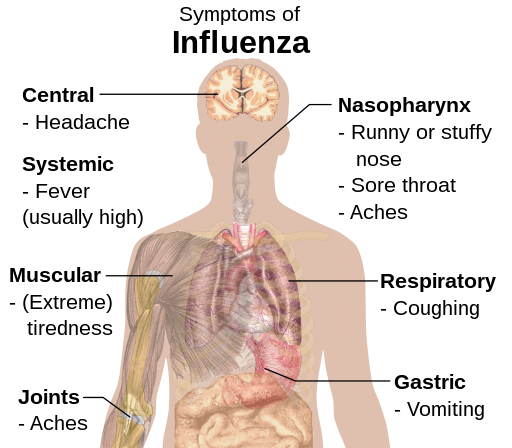As flu activity spreads rapidly across America, doctors are urging people to get a flu shot now, as well as taking other steps to protect themselves from influenza and some of its complications. Flu is now at “epidemic levels”, say public health authorities.
According to the CDC’s
Dr David Lakey, DSHS (Department of State Health Services) Commissioner, Texas, said “Texas, like much of the country, saw an early start to the flu season and continues to experience a high level of flu and flu-like illness. The best thing people can do to protect themselves is to get a dose of flu vaccine now. There is plenty of vaccine available.”
The CDC (Centers for Disease Control and Prevention) says that flu activity continues to be high in most of the country – 47 states. However, in the South and Southeast, which were badly hit early on in the season, activity has recently dropped slightly.
Each year’s vaccines target three different strains of flu. According to the CDC (Centers for Disease Control and Prevention), this year’s flu vaccine is a very good match for the strains currently in circulation.
Even though the number of flu cases are extremely high this winter, health authorities around the country are not reporting particularly severe cases this season compared to others.
The CDC recommends that all Americans aged at least six months be vaccinated against flu. Those in high risk groups especially, should make sure they have the flu shot.
Examples of high risk groups include:
- Young children and babies (over six months)
- Seniors (people aged 65+ years)
- Pregnant mothers
- People with chronic health conditions/diseases, such as diabetes, kidney diseases, or COPD (chronic obstructive pulmonary disease)
- Organ transplant recipients who are on immunosuppressant medications
People in these high risk groups are much more likely to suffer from flu complications, which can sometimes be life-threatening. Complications from flu may include worsening asthma, congestive heart failure or diabetes symptoms, as well as pneumonia, sinus and ear infections, and dehydration.
Flu symptoms usually come on rapidly and include:
- Aches and pains throughout the body
- Blocked and/or runny nose
- Chills, cold sweats
- Extreme tiredness (fatigue)
- Fever
- Sore throat
- In some cases, the patient may vomit
The signs and symptoms of flu can last a week, and can linger for even longer.
Lakey said that if you have a sudden onset of fever plus a cough or sore throat, you should contact your doctor immediately.
As well as protecting yourself from flu by getting vaccinated, remember to wash your hands frequently, cover all coughs and sneezes either with a tissue or by coughing into the inside of your elbow. Stay at home if you are ill.
Health authorities say that flu vaccines may soon be in short supply. People are encouraged to call around to different vaccine providers if they have problems finding one that is well stocked.
Tom Skinner, a spokesman for the CDC, told Fox News that if somebody has not been vaccinated and wants one, they might have to look in several places.
The best way to protect yourself from catching flu is to receive the vaccine, health experts say. It is said to be about 60% effective.
Vaccine makers say that 128 million vaccine doses have been distributed throughout the USA since the beginning of January, 2013.
Four of the six different Fluzone seasonal flu vaccine doses made by Sanofi SA are sold out, the company said yesterday. Sanofi blames “unanticipated demand”.
A spokesman for Sanofi, Michael Szumera, said “At this point we are not able to make any more vaccine because we are gearing up for next year’s vaccine.”
Sanofi is the largest flu vaccine provider in the USA.
Novartis, another company that makes flu shots, wrote “To date, Novartis has not been aware of any shortage of Novartis flu vaccines from its distributors. The doses delivered were planned to meet the projected demand. Novartis is working closely with its partners and public stakeholders to monitor the situation and potentially bring additional doses to the market if needed.”
Roche, the makers of Tamiflu, says there is a shortage of the drug in liquid form (usually administered to children). Tamiflu is an antiviral medication which either slows down symptom progression or stops them.
Written by Christian Nordqvist
